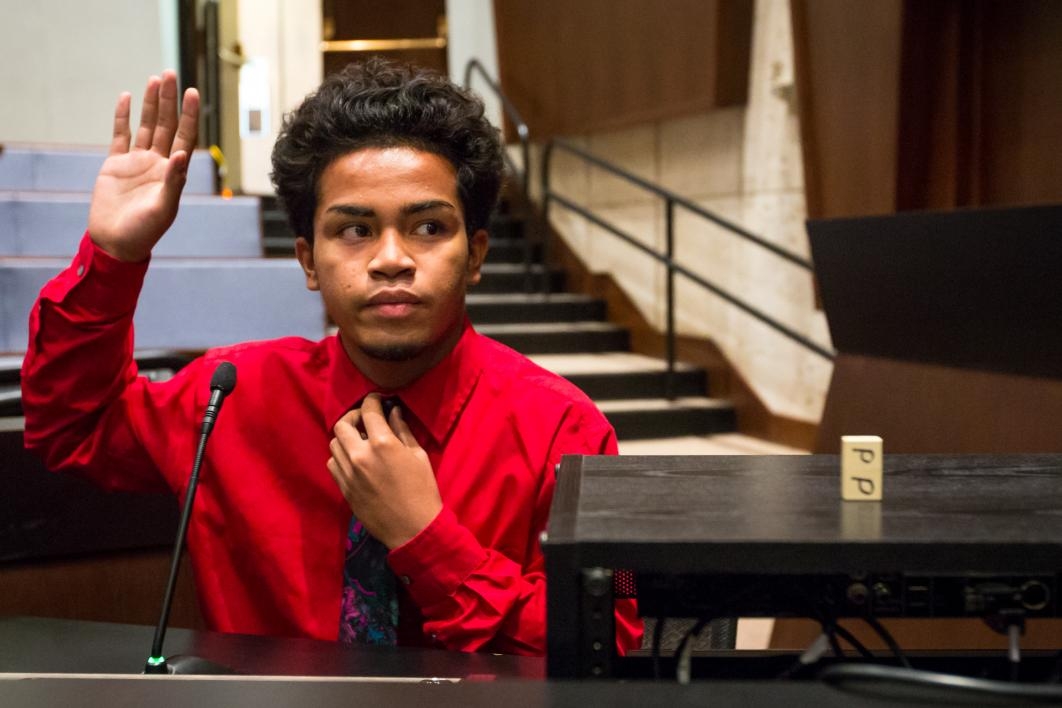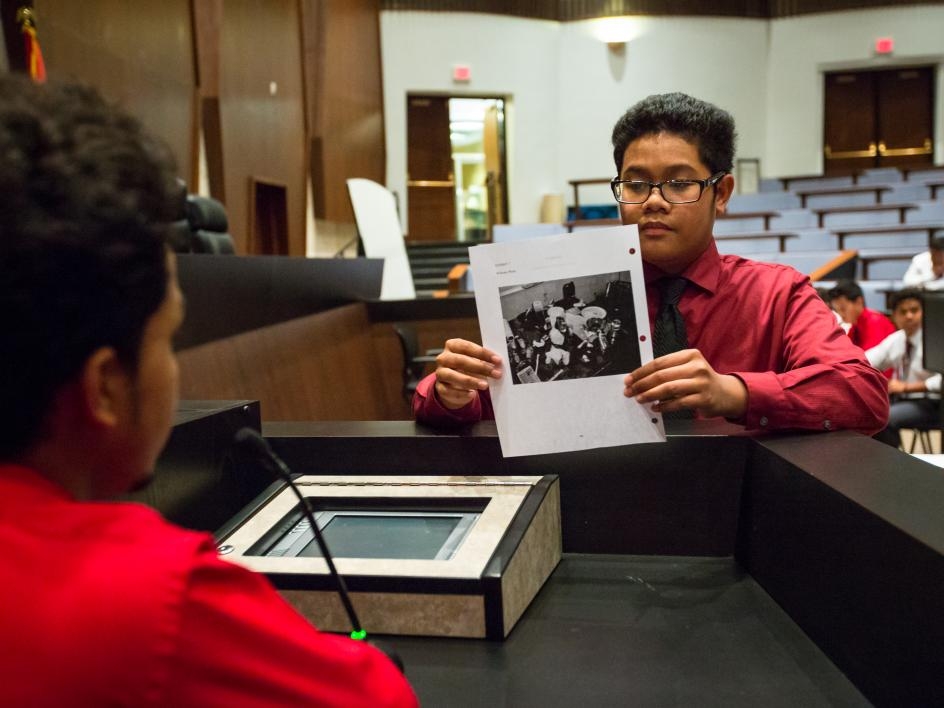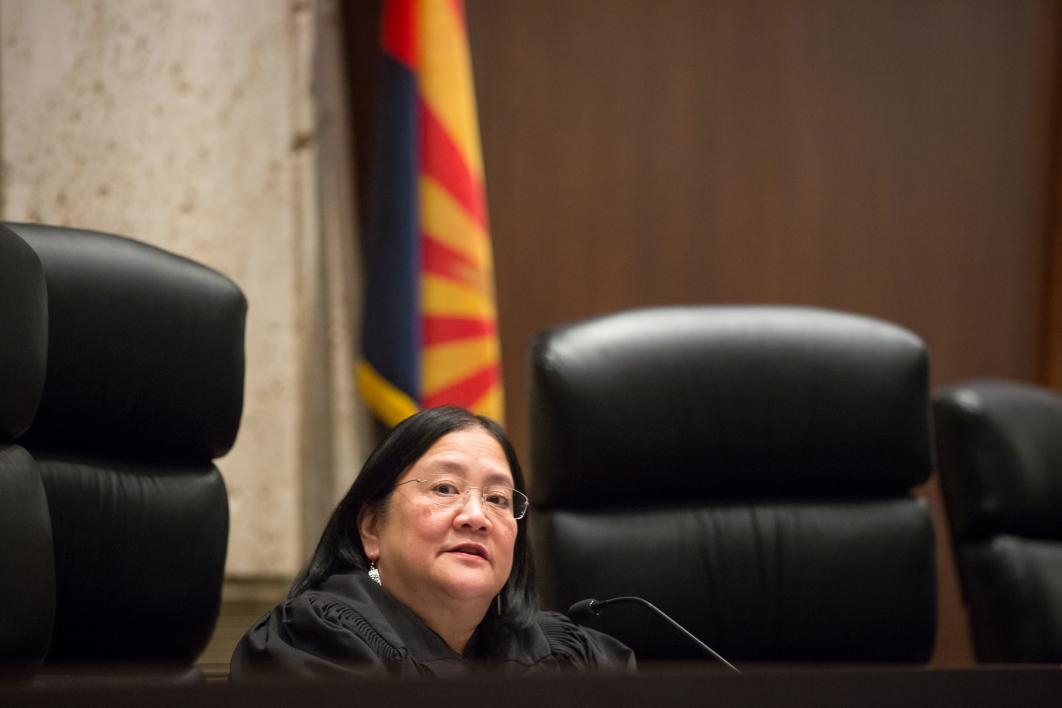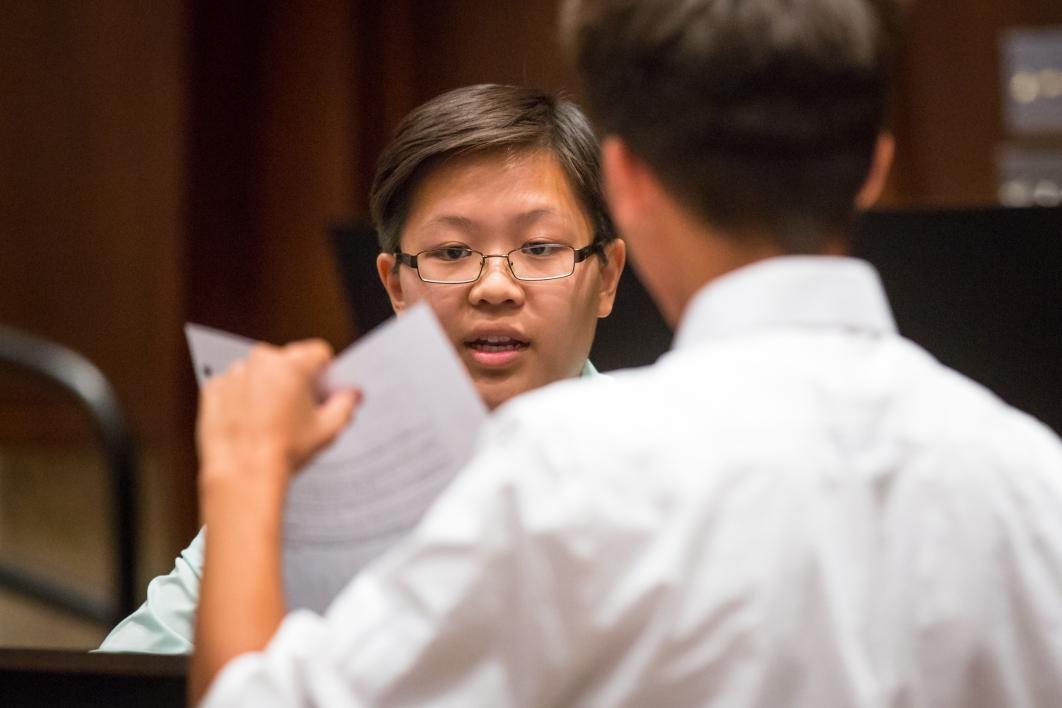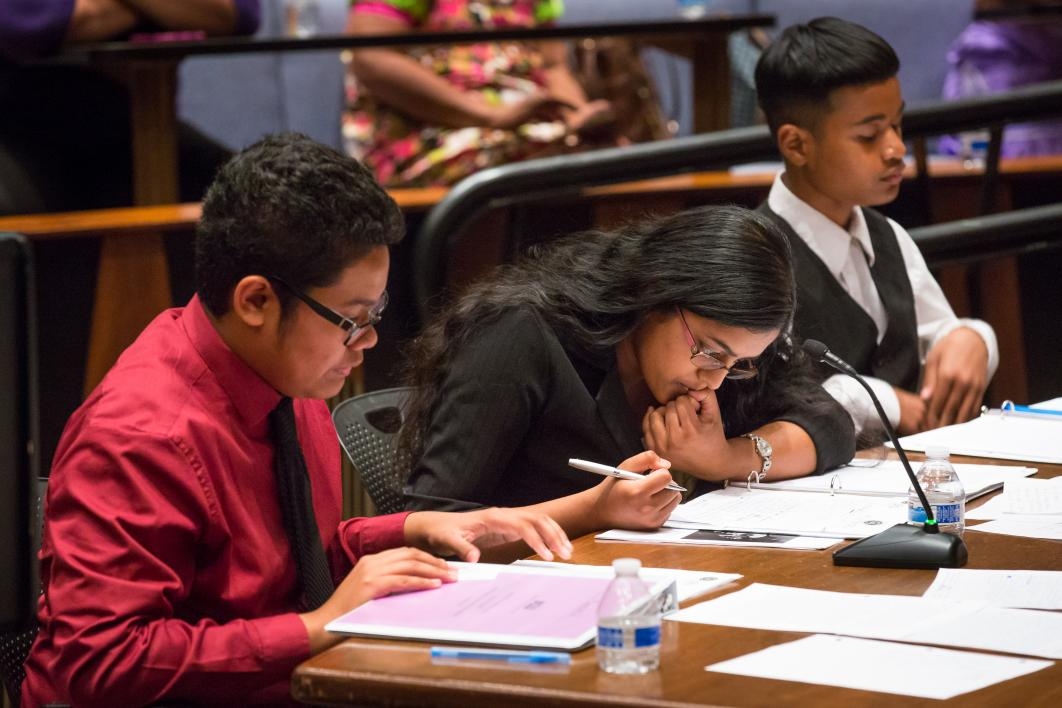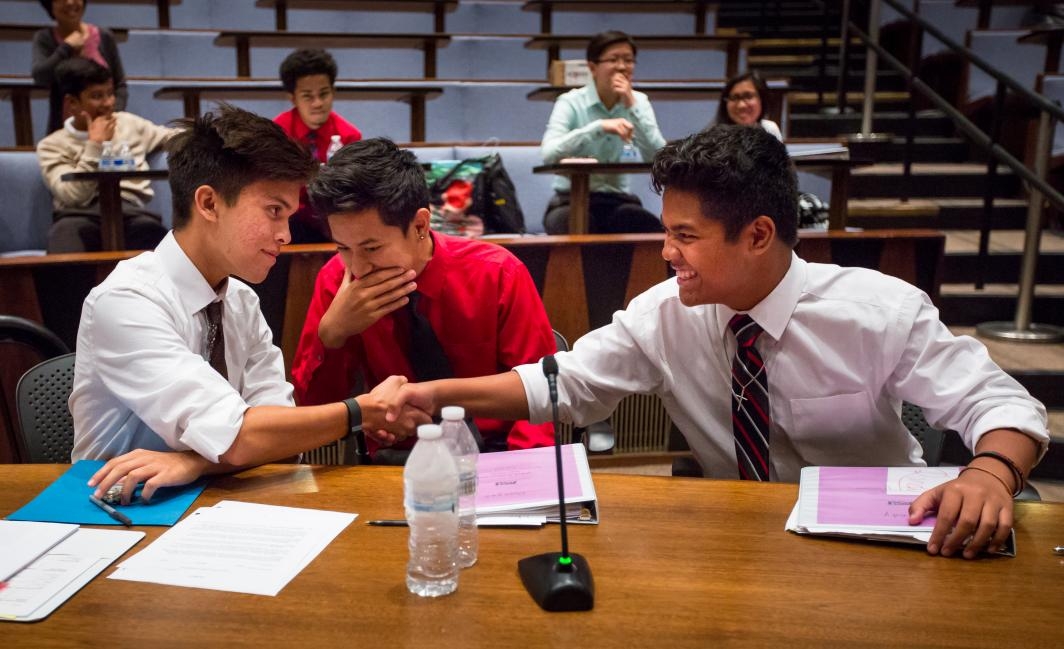ASU’s APACE Academy: A week of confidence-building, a day in court
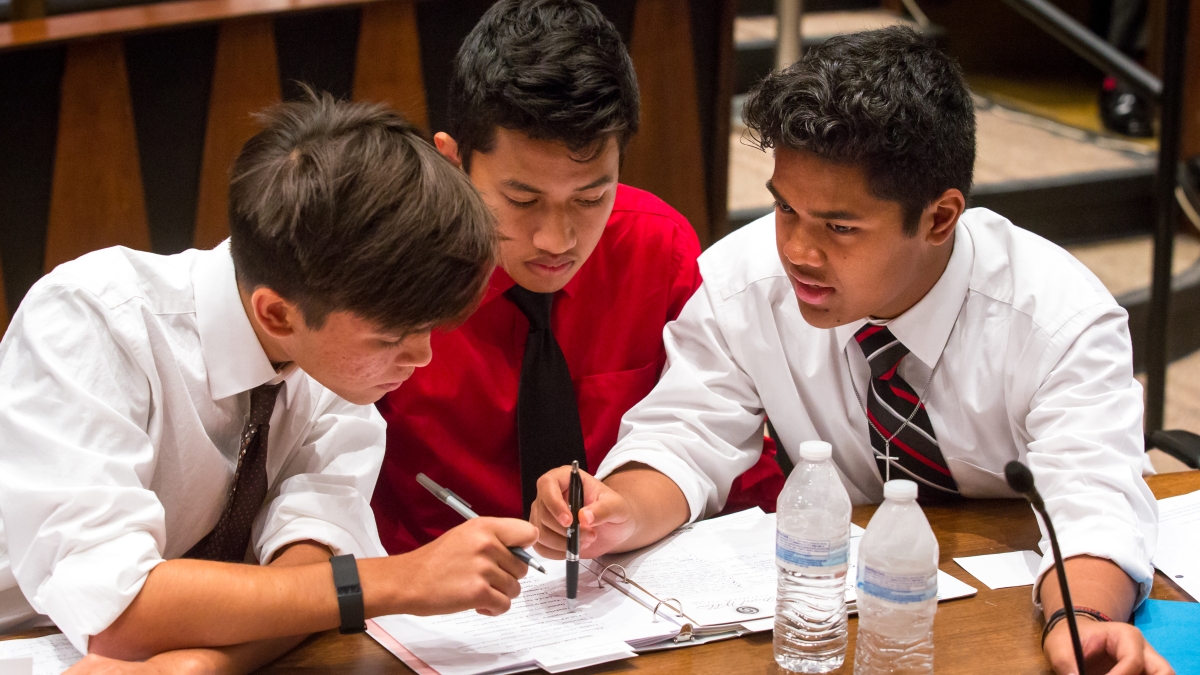
Defense attorneys (from left) Marc Flom, 16, Dwayne Lanwe, 16, and Randy Oshiro, 15, plan strategy in the mock trial of Parker Smith v. Pioneer Computers Inc. & Pine Crest Tech Services Inc., concluding the weeklong APACE Academy at ASU. The five-day summer program for high school students focuses on Asian-American and Pacific Islander history, culture and contemporary issues, as well as cultural competency, public-speaking and civic engagement. Photo by Charlie Leight/ASU Now
It was the moment high school sophomore Randy Oshiro had been looking forward to most since learning he’d get to participate in a mock trial as part of the APACE (Asian Pacific Advocacy, Culture and Education) Academy held June 13-17 on ASU’s Tempe campus.
“Objection,” Oshiro said, in his voice that perceptible mix of anticipation and thrill that a tennis player gets when positioning the racket for a smash.
The Dobson High School student was testing his mettle as a defense attorney Friday, in the case of Parker Smith v. Pioneer Computers Inc. & Pine Crest Tech Services Inc., and the volley between the defense witness and plaintiff’s attorney had been building momentum.
“On what grounds, counsel?” responded the Honorable Roxanne Song Ong, retired Phoenix Municipal Court chief presiding judge, as she looked down from the bench in the Great Hall of ASU’s Sandra Day O’Connor College of Law.
“Speculation,” he said, after quickly conferring with co-counsels Dwayne Lanwe and Marc Flom, juniors from Tempe High and Madison Highland Prep (pictured above, right to left).
“I’ll sustain that,” Judge Song Ong replied, and the trial moved to closing arguments from the plaintiff’s counsel, delivered by Shalini Vijayaraghavan, a junior from Hamilton High School.
Song Ong, at trial’s end, offered helpful critique and tips to all 12 student participants.
She praised the acting abilities of the witnesses and the command that all the participants had of the facts in the 74-page case, in which the plaintiff, an 18-year-old high school student who had signed contracts as an adult, alleged that a theft-tracking system on a school-issued laptop had violated his privacy and caused emotional harm.
“You did a very, very good job, given the complexity of this case — one that would take lawyers several months to prepare for,” Song Ong noted.
“As a judge for nearly 30 years, I can tell you I have many lawyers coming into my courtroom who are not as prepared as your kids were today,” she told the parents in attendance, who acted as jurors.
The mock trial was the culmination of a full week of APACE Academy presentations and activities.
Phoenix lawyers Amanda Chua, Thomas Chiang, Alanna Duong and Briana Chua — all members of the Arizona Asian American Bar Association — had spent part of two days giving students a peek into some of the career paths of attorneys and helped prep the APACE Academy participants for the trial, explaining the goals and the rules of direct examination and cross-examination, opening and closing arguments, and what constitutes evidence. They advised students as they developed their strategies and taught them about courtroom etiquette.
Earlier in the week, School of Social Transformation faculty led sessions on Asian-American and Pacific Islander history, community advocacy, challenging media stereotypes and how to do oral history interviews.
University College organized sessions to grow students’ confidence and college-readiness, with a focus on topics including discovering their own hero’s Journey, developing grit and resiliency, differences between high school and college, and resources for paying for college.
The teens also enjoyed team-building challenges, time for cultural sharing — bringing in items or performing a song that reflected their own culture — and discussions and journaling led by the ASU students who served as peer mentors: Misaki Fuentes-Maruyama, a marketing major, and Anthony Sablan, a nutrition major.
At the close of the activities Friday, the peer mentors sent students on their way with certificates, hugs and heartfelt words about the unique contributions that each made to the group dynamic and advice to shed their self-doubts.
There’s a good chance that some of this year’s cohort will go on to careers influenced by their APACE Academy experience, judging from the stories of past participants.
In 1994, Tom Chiang actually was a student in ASU’s first Asian LEAD cohort (the former name of the APACE Academy).
“I was 15 and my parents told me, 'You’re going to go to ASU with a bunch of kids and do this program,'” Chiang recalled in his remarks to the APACE students Wednesday.
“I met really cool people; I did the mock trial. I grew as a person and gained leadership skills … and I’ve been practicing criminal defense law since 2007. I absolutely love what I do,” he said. “And I’m the only lawyer in my family.”
Chiang’s story reflects well the overall goals for the program, said APACE Academy director Kathy Nakagawa, ASU associate professor of Asian Pacific American Studies.
“Our hope is to provide a space where Asian-American and Pacific Islander high school students can expand their voice and confidence while learning skills that will support them in their dreams for college and beyond,” Nakagawa observed. “We greatly appreciate the incredible volunteer efforts of faculty, staff, parents and other community members who come together to make this experience possible.”
At ASU, the APACE Academy is sponsored by Asian Pacific American Studies in the School of Social Transformation, a unit of the College of Liberal Arts and Sciences; by University College; and with the support of community partners including Island Liaison and the Arizona Asian American Bar Association.
